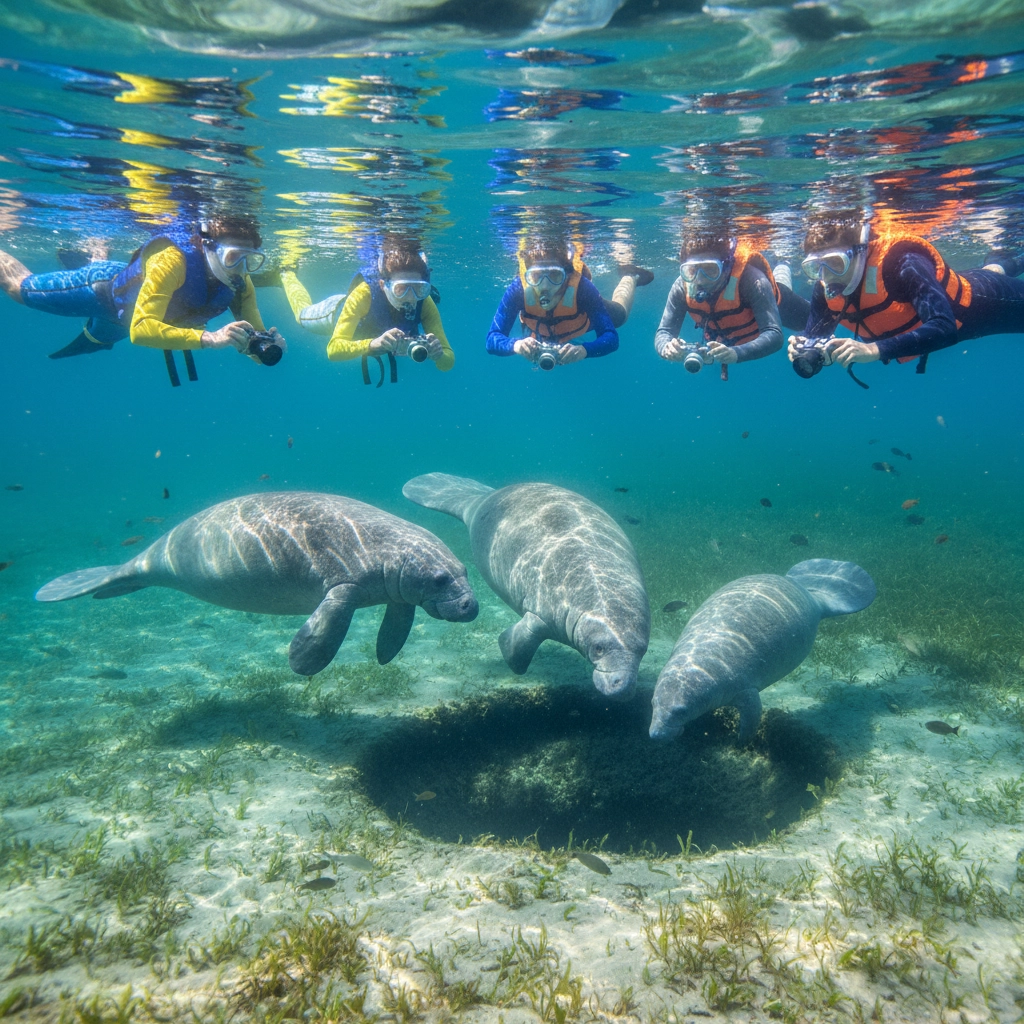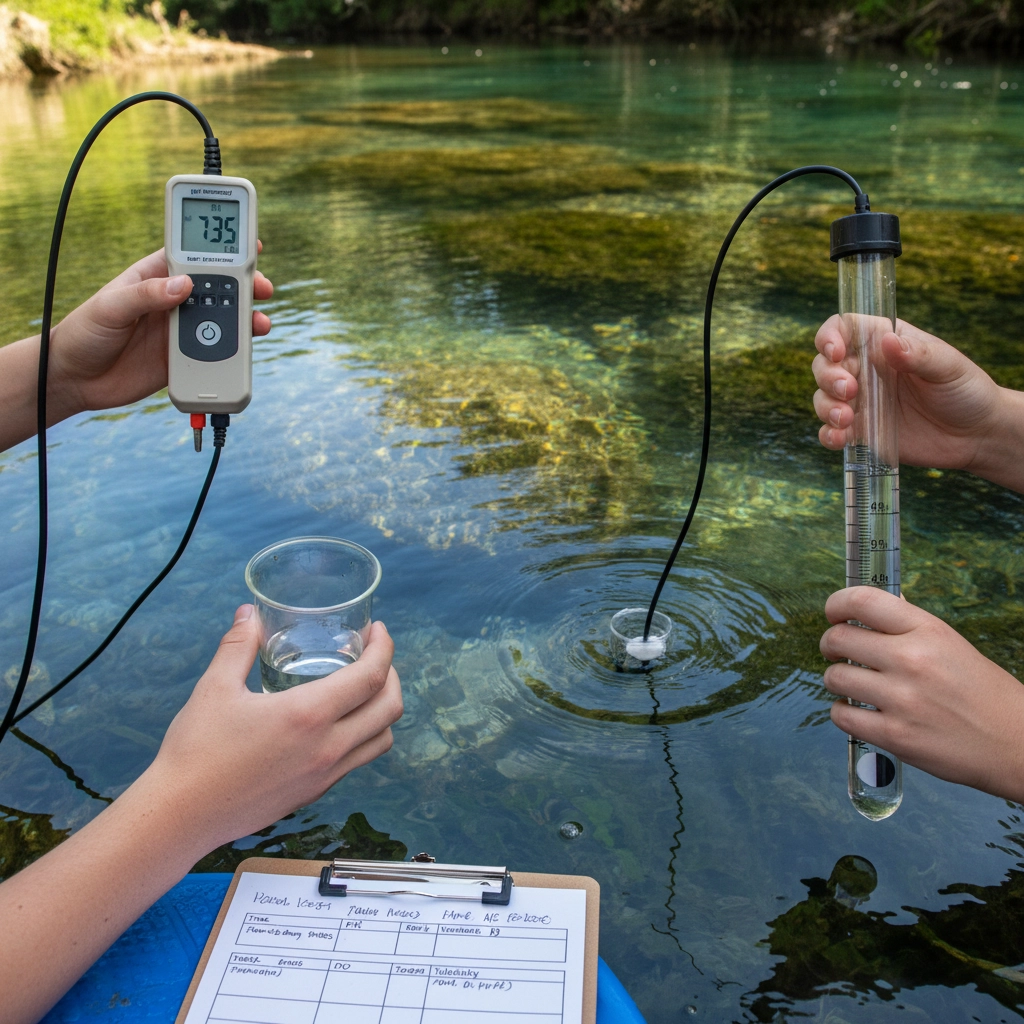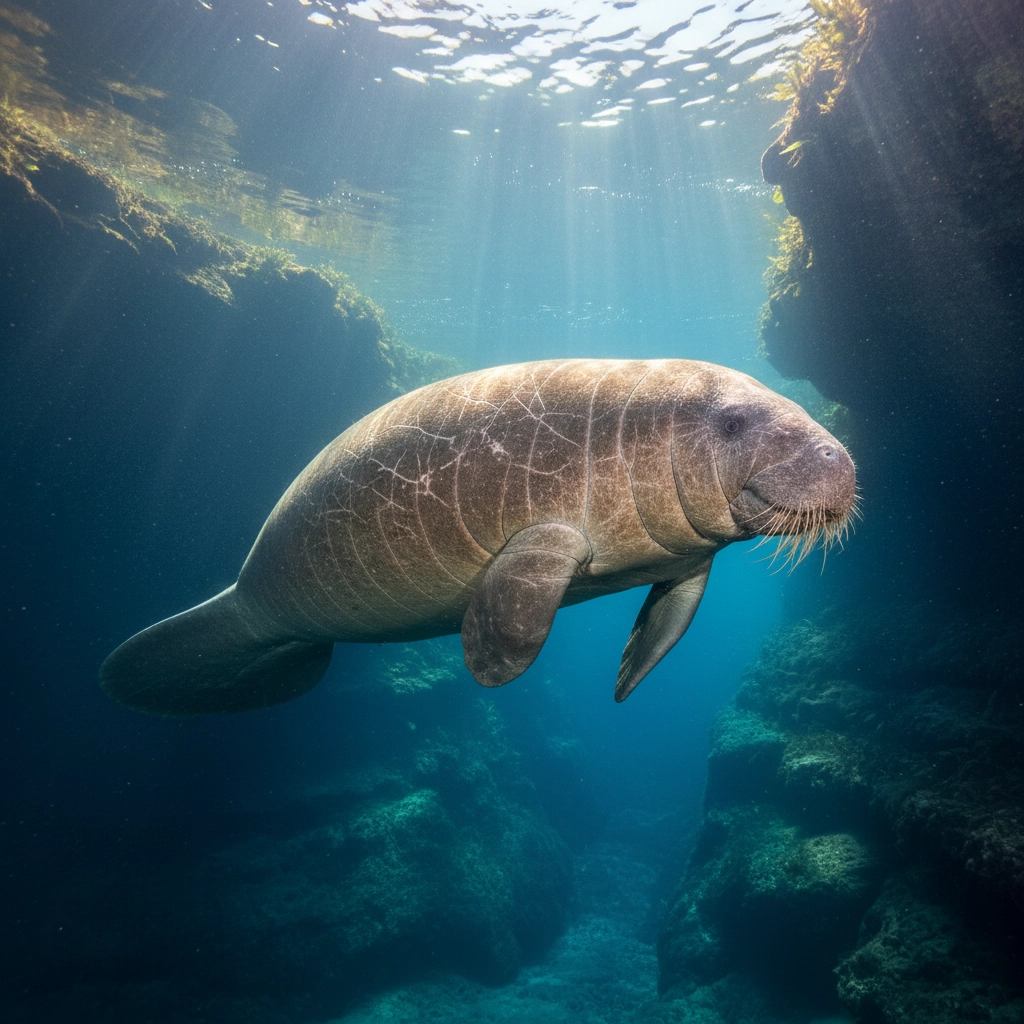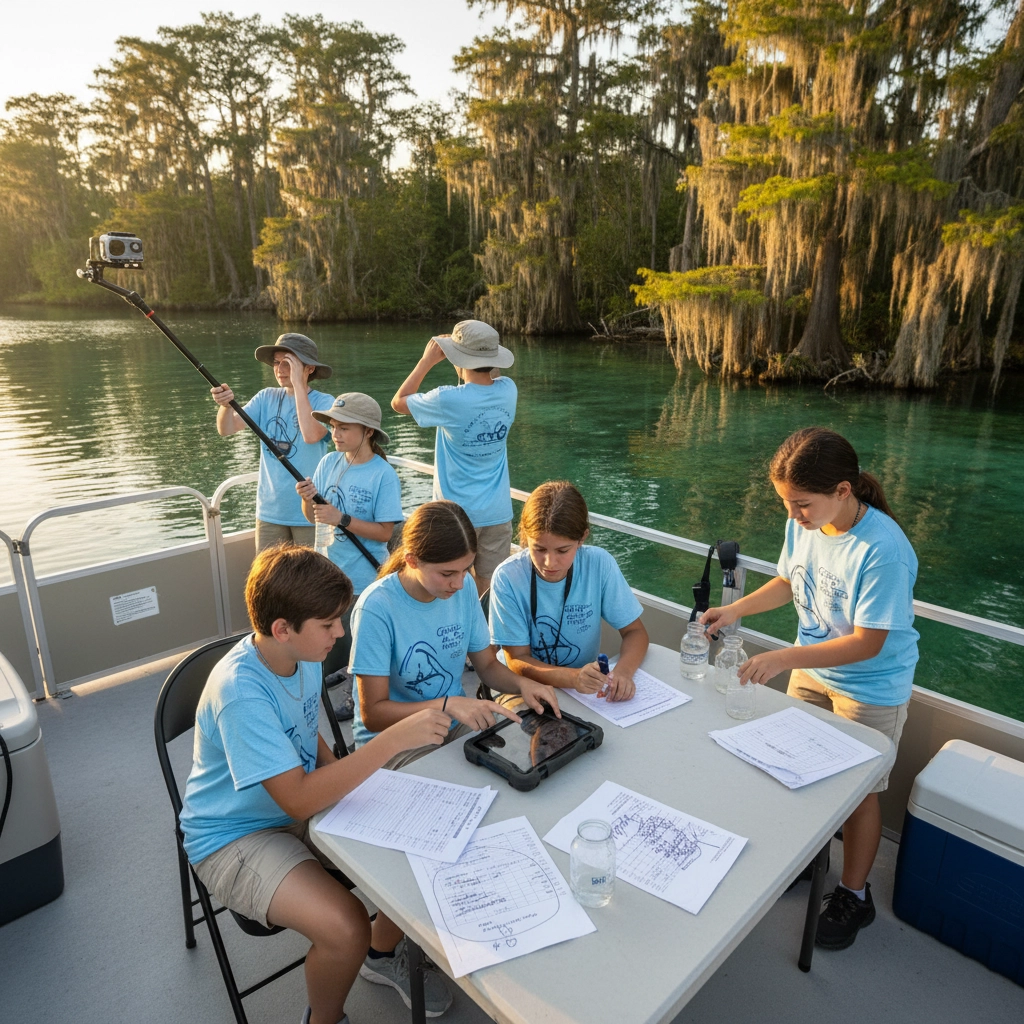Crystal River Marine Science Expeditions: How Students Become Citizen Scientists
- Caleb Mullenix
- Oct 27, 2025
- 6 min read
Transforming students into active contributors to marine science research represents one of the most impactful educational experiences available today. Crystal River, Florida, offers an unparalleled opportunity for students to engage in authentic scientific research while developing critical field science skills and contributing meaningful data to ongoing conservation efforts.
The importance of citizen science in marine conservation cannot be overstated. With Florida's manatee population facing unprecedented challenges from habitat loss, boat strikes, and water quality issues, the data collected by student researchers provides essential information for wildlife managers and conservation scientists working to protect these gentle giants.
Why Crystal River Stands Apart for Marine Science Education
Crystal River represents a unique convergence of pristine spring-fed waterways, diverse marine ecosystems, and year-round manatee populations that create an ideal living laboratory for student scientists. The area's crystal-clear waters, maintained at a constant 72°F by natural spring systems, provide exceptional visibility for underwater observations and data collection activities.
The region's significance extends beyond its natural beauty. Crystal River serves as a critical warm-water refuge for West Indian manatees, hosting the largest concentration of manatees in Florida during winter months. This concentration provides students with unparalleled opportunities to observe, document, and contribute to ongoing research efforts focused on manatee behavior, population dynamics, and habitat utilization.

Structure of a Typical Crystal River Marine Science Expedition
A comprehensive Crystal River marine science expedition follows a carefully structured approach designed to maximize learning opportunities while ensuring meaningful scientific contributions. The expedition typically spans three to five days, incorporating both classroom preparation and intensive fieldwork components.
Pre-Expedition Preparation
Begin preparation by introducing students to fundamental marine science concepts, including aquatic ecosystem dynamics, manatee biology, and spring formation processes. Establish clear learning objectives that emphasize both scientific understanding and practical data collection skills.
Review safety protocols extensively, covering water safety procedures, wildlife interaction guidelines, and equipment handling procedures. Emphasize the importance of maintaining appropriate distances from manatees and following all federal and state wildlife protection regulations.
Introduce students to citizen science methodologies, explaining how their data contributions will support ongoing research initiatives and conservation management decisions.
Day One: Orientation and Ecosystem Assessment
Commence the expedition with comprehensive site orientation, introducing students to Crystal River's unique spring-fed ecosystem. Conduct initial water quality assessments, teaching students to measure temperature, dissolved oxygen, pH levels, and turbidity using professional-grade scientific instruments.
Establish baseline data collection protocols, ensuring students understand proper data recording procedures and the importance of accurate, consistent measurements. Assign specific roles to team members, including data recorder, equipment manager, and observation specialist positions.
Day Two: Manatee Observation and Behavioral Documentation
Focus intensive efforts on structured manatee observation sessions, teaching students to identify individual animals through scar patterns, body size, and behavioral characteristics. Implement systematic data collection procedures for recording manatee locations, group compositions, and activity patterns.
Guide students through proper wildlife observation techniques, emphasizing the importance of maintaining respectful distances while gathering scientifically valuable data. Document environmental conditions that may influence manatee behavior, including water temperature variations, tidal influences, and human activity levels.

Essential Field Science Skills Development
Students participating in Crystal River expeditions develop a comprehensive suite of field science skills that extend far beyond traditional classroom learning experiences. These skills represent fundamental competencies required for careers in marine science, environmental research, and conservation biology.
Scientific Observation and Documentation
Teach students to conduct systematic observations using standardized protocols developed by marine science professionals. Emphasize the importance of objective data collection, proper field note techniques, and accurate photographic documentation procedures.
Introduce students to GPS technology for precise location recording, teaching them to correlate geographical coordinates with specific observation data points. Demonstrate proper use of underwater cameras for documenting manatee behavior and habitat characteristics.
Water Quality Monitoring Techniques
Provide hands-on training with professional water quality monitoring equipment, including dissolved oxygen meters, pH sensors, and turbidity measurement devices. Teach students to recognize the relationships between water quality parameters and ecosystem health indicators.
Guide students through proper sample collection procedures for laboratory analysis, emphasizing contamination prevention and chain-of-custody protocols essential for scientific data integrity.
Data Analysis and Interpretation Skills
Introduce students to basic statistical analysis techniques for interpreting collected data sets. Teach them to identify patterns, trends, and anomalies within their observations that may indicate significant ecological relationships or environmental changes.
Demonstrate how individual data points contribute to larger research initiatives, helping students understand the cumulative impact of citizen science contributions to conservation efforts.
Manatee Research and Wildlife Encounters
The manatee component of Crystal River expeditions provides students with extraordinary opportunities to contribute to ongoing research efforts while developing deep appreciation for marine wildlife conservation. These encounters are carefully structured to ensure both educational value and wildlife protection.
Behavioral Observation Protocols
Implement systematic behavioral observation protocols that teach students to recognize and document specific manatee activities, including feeding behaviors, social interactions, and resting patterns. Train students to identify different age classes and record group composition data that contributes to population assessment efforts.
Emphasize the importance of maintaining appropriate observation distances as required by federal law, while teaching students to use binoculars and telephoto camera lenses for detailed behavioral documentation. Explain how behavioral data contributes to habitat management decisions and protection policy development.
Individual Identification Techniques
Teach students to recognize individual manatees through distinctive scar patterns, body markings, and physical characteristics that serve as natural identification markers. Introduce them to photo-identification techniques used by professional researchers to track individual animals over time.
Guide students through the process of contributing their photographic documentation to regional manatee identification databases, demonstrating how citizen science contributions support long-term population monitoring efforts.

Citizen Science Data Collection Methods
The citizen science component represents the cornerstone of Crystal River marine science expeditions, transforming students from passive observers into active contributors to scientific research initiatives. This transformation requires systematic training in professional data collection methodologies.
Standardized Data Collection Protocols
Implement standardized data collection forms developed in collaboration with professional marine science organizations. Train students to record observations using consistent terminology, measurement units, and documentation procedures that ensure data compatibility with ongoing research databases.
Establish quality control procedures that include peer review processes, where student teams verify each other's observations and measurements before final data submission. Emphasize the critical importance of accuracy and honesty in scientific data collection.
Technology Integration for Data Collection
Introduce students to mobile data collection applications designed specifically for citizen science marine research. Train them to use GPS-enabled devices for precise location recording and time-stamped observation logging.
Demonstrate proper use of underwater cameras, hydrophones, and other specialized equipment that enhances data collection capabilities while providing students with exposure to professional research tools.
Database Contribution Procedures
Guide students through the process of submitting their collected data to established scientific databases used by marine researchers and wildlife managers. Explain how their contributions become part of larger datasets that inform conservation decisions and policy development.
Provide students with access to view their data contributions within the broader context of ongoing research initiatives, helping them understand the cumulative impact of citizen science efforts on marine conservation.
Real-World Impact and Learning Outcomes
Crystal River marine science expeditions produce measurable learning outcomes that extend far beyond traditional educational experiences. Students develop scientific literacy, environmental awareness, and conservation ethics that influence their academic and career trajectories.
Scientific Literacy Development
Assess students' understanding of marine ecosystem concepts, scientific methodology, and data analysis techniques through practical application during fieldwork activities. Document their ability to formulate hypotheses, collect relevant data, and draw evidence-based conclusions about observed phenomena.
Evaluate students' proficiency in using scientific instruments, following standardized protocols, and communicating findings through written reports and oral presentations to peer groups.
Conservation Awareness and Ethics
Measure changes in students' environmental awareness and conservation attitudes through pre- and post-expedition assessments. Document their understanding of human impacts on marine ecosystems and their ability to propose evidence-based conservation solutions.
Assess students' development of ethical frameworks for wildlife research and conservation, including their understanding of animal welfare considerations and regulatory compliance requirements.

Safety Considerations and Risk Management
Ensuring student safety during Crystal River marine science expeditions requires comprehensive risk assessment and mitigation strategies that address both aquatic environments and wildlife interactions. Implement thorough safety protocols that protect students while maintaining educational value.
Water Safety Protocols
Establish comprehensive water safety procedures that include mandatory life jacket use, buddy system implementation, and constant adult supervision during all aquatic activities. Verify student swimming abilities and implement alternative participation strategies for non-swimmers.
Maintain emergency communication equipment and establish clear evacuation procedures for various emergency scenarios. Ensure all supervising adults possess current water safety certifications and emergency response training.
Wildlife Interaction Guidelines
Emphasize strict adherence to federal and state wildlife protection regulations, including mandatory minimum distance requirements for manatee observations. Train students to recognize signs of wildlife stress and implement immediate response protocols to minimize disturbance.
Provide clear guidelines for appropriate student behavior during wildlife encounters, emphasizing the importance of quiet observation and respectful interaction practices that prioritize animal welfare over educational convenience.
Crystal River marine science expeditions represent transformative educational experiences that develop scientific literacy, environmental awareness, and conservation ethics while contributing meaningful data to ongoing research initiatives. Through systematic preparation, structured fieldwork, and comprehensive safety protocols, these expeditions prepare students to become informed environmental stewards and potential marine science professionals who understand their role in protecting Florida's precious marine ecosystems for future generations.



Comments